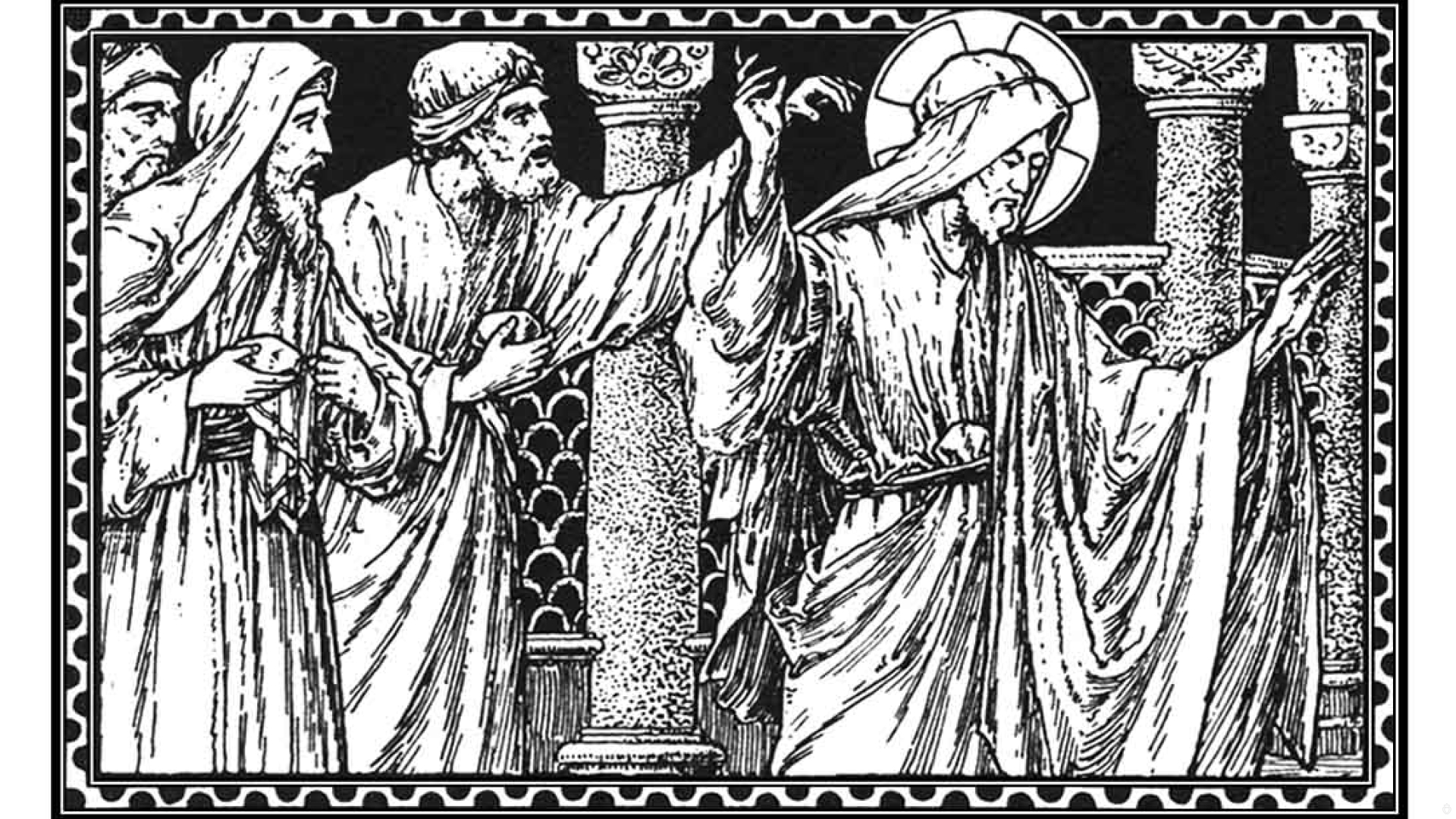Passion Sunday - Enemies of Christ

The Mass today is preoccupied almost entirely with the coming sacrifice of Our Lord on Calvary. His enemies. are gathering in councils and thinking up plans to rid themselves of Him. As an expression of her foreboding, the Church leaves out the Glory be to the Father in the Introit and at the Washing of Hands during the Offertory; she veils the crucifixes and statues with sombre violet, and for the next two weeks she keeps before us her incessant concern with the cost of our redemption. In days of old the faithful of Rome went to St. Peter's, and spent the night in fast and vigil in preparation for the ordination of priests and deacons; but even then, the Church is not distracted in her attention to the Passion of Christ and the events which led up to it.
THE FIRST GUSTS OF THE COMING TEMPEST
The Introit borrows the psalm which is usually said at the foot of the altar, and thus attempts to emphasize the plotting against Our Lord which drives Him to call upon God for judgment against His treacherous and cruel foes. A storm is gathering in His soul, and the opening words of to-day's Mass are like the first gusts of wind in the chill autumn which give warning of a furious tempest: "Judge me, O God, and sustain my cause against a race which knows no piety; save me from a deceitful and a wicked foe; all the strength I have is in Thee, my God."
Psalms cxlii and cxxviii which are recited in part after the Epistle give poetic urgency to Our Lord's cry to His Father: "Snatch Me from My enemies," He cries; "put Me out of reach of their assaults and their wickedness..." But the cry is not one of despair, for He knows that at last God will triumph, and the tyranny of sinners will be over come. The language of the psalm is almost violent: "The just God shall break the necks of sinners!" The whole spirit of these prayers may well be adapted to our own need for liberation from sin. How many times men feel the vicious grip of sin upon them and look to the heavens for rescue! The cry for redemption was heard by God, and now His only Son makes ready to go into the temple (as St. Paul suggests in the Epistle), and shed His own precious Blood for our ransom.
CHRIST SURROUNDED BY HIS ENEMIES
The Gospel was chosen to represent the complete break between Our Lord and the Synagogue. He asks the Jews openly why they do not believe Him, and they answer outrageously: "Because Thou hast a devil!" Yet, they cannot think of a single sin He has ever committed, and He invites them to convict Him of doing anything wrong. That immunity alone should have started them thinking; where had they ever heard of anything so just? But they continued their insults, and the mild answers Our Lord gives them are only a further proof that He came to save, if possible, even a remnant of His believers. He reveals Himself to them as openly as He can-comes out with the very eternity of His existence, the most essential of God's infinite perfections: that He always was and always will be. "Before Abraham was, I am." The proper thing to have done when Our Lord said that, would have been to fall upon their faces and adore Him; but they picked up stones to throw at Him and He had to go and hide. What would you say if you were to come upon the Son of God hiding in some corner of the temple with a mixture of sadness and pity in His infinite countenance? He is not terrified by stones, but by sin and unbelief. Sometime in temptation it would be strengthening to see His face as it is there in the corner! No, Christ's enemies have gone beyond the listening point; their hearts are hardened and they have but one determination-get rid of Him.
CHRIST VIEWS MANKIND WITH PITY AND LOVE
In the Offertory verse from Psalm cxviii, our Divine Saviour makes an act of resignation; He came to save and to give life, and so He begs for a risen and eternal life at the very time the Jews are seeking to put Him to death; and His plea for life is backed up by His willingness to be obedient unto death, even the death of the Cross: "... Crown Thy servant with life to live faithful to Thy commands and give me the saving help Thou didst promise me." Our Lord does not plead for His own life, for He can say with His heavenly Father: "I am who am." But, as our Mediator, He can pray that we may have eternal life, that His tremendous sacrifice will not have been for nothing, that even those with stones ready to east may drop them and repent!
At the Communion, the Church takes the most solemn words ever uttered by Our Lord and brings into focus for us the combination of redemption and Eucharist: "This Body is given for you: here is the cup of the New Testament with My Blood: do this in remembrance of Me..." Now indeed we enter upon the season of the Passion and Jesus is about to be led away; His enemies are seizing Him, but He goes willingly, looking at us with pity and with love!





